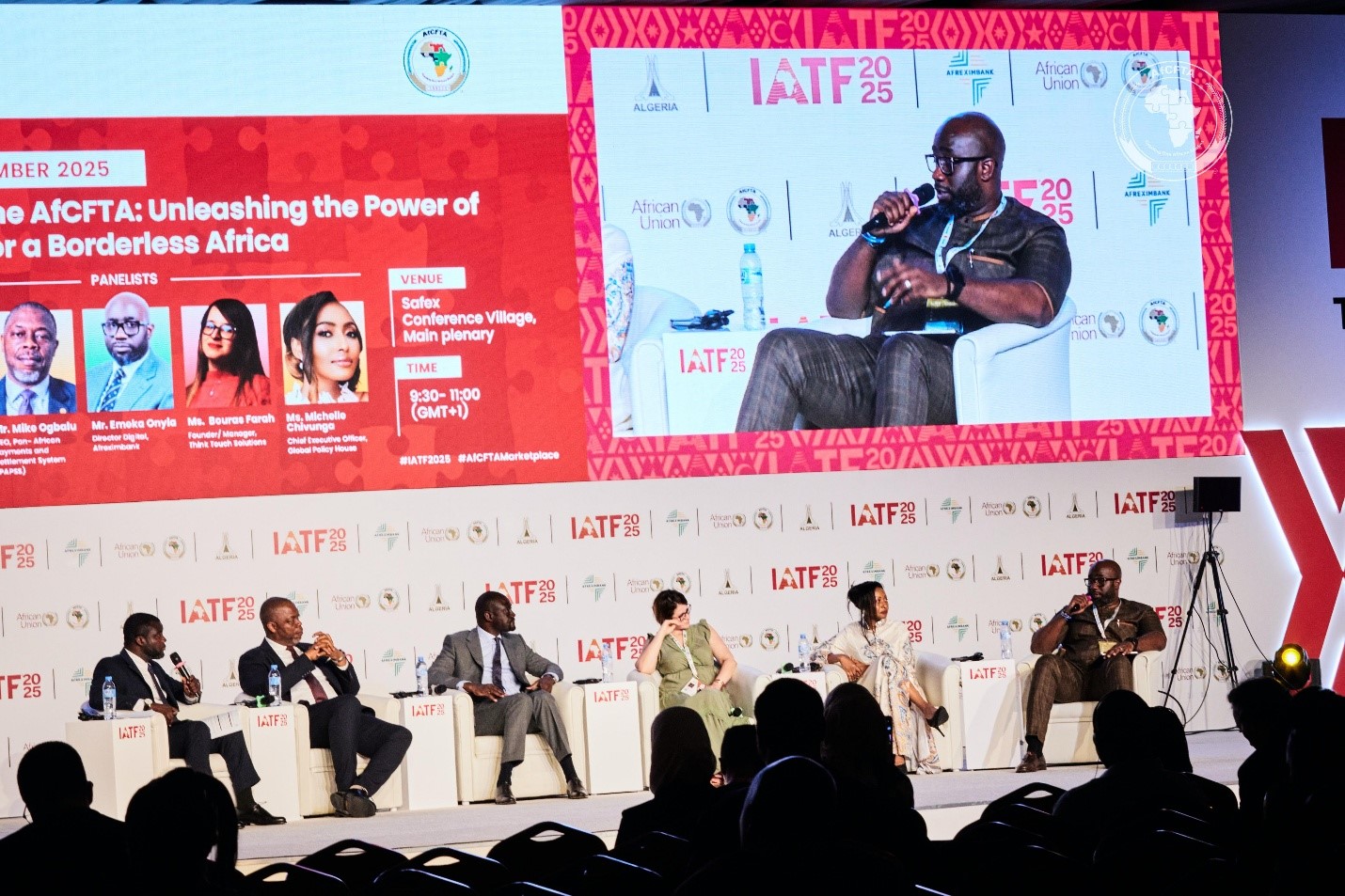By Francis
Copyright thebftonline

Experts have praised the AfCFTA Digital Trade Protocol as a game changer that has created a legal framework and basis to drive and shape the future of digital trading to accelerate Intra-Africa trading.
“We’ve seen this over the last few years as a task force looking at the digital trade protocols of the AfCFTA. It is a game changer, and it is very important for my bank to participate in its implementation.” Says Mr. Emeka Onyia, Director in charge of Digital Trade at Afreximbank.
Speaking at a high-level panel on how to unleash the power of digital trade for a borderless Africa, distinguished experts in the space of digital trading, financing and banking across the continent took turns to highlight their individual experiences from varying institutions and the difference the AfCFTA Digital trade protocol has brought to Africa’s borderless trading.
Mr. Emeka Onyia explained that Afreximbank is embarking on a number of partnerships and views the banks digital rail as a means to turn the AfCFTA Digital Trade protocol into reality.
“Our role in the bank is to be the architects and the convener across the continent to provide those rails and to support the governments and partners to establish wonderful infrastructure.” “Someone needs to lead, and we are doing that, setting up innovation hubs and labs within the bank where we are looking into things like digital and alternative currencies. So, we are taking this quite seriously and this is how we are doing this beyond financing and through partnerships which the AfCFTA protocol on Digital Trade offers.”
The AfCFTA Protocol on Digital Trade is said to hold transformative power for a borderless Africa, enabling seamless cross-border electronic commerce, enhancing economic integration and expanding market access and opportunities for businesses, particularly the Micro, Small And Medium Enterprises (MSMEs), which make up over 90% of the African market.
The Protocol empowers African businesses, including Micro, Small, And Medium Enterprises (MSMEs), to reach consumers across all 55 Member States of the African Union (AU) without the need to establish physical stores or obtain operating licenses in every country. The Digital Trade protocol also harmonizes digital trade regulations and support enterprises in scaling and collaborating across borders in Africa.
According to the experts, the whole point of the AfCFTA digital trade protocol is to reduce physical interaction and move into a digital marketplace to reduce cost and risks of trading on the continent and transform market operations in Africa.
“Let’s recognize that the AfCFTA Digital Trade Protocol is a great achievement, and we need to commend the AfCFTA Secretariat for bringing that to us. I am a very proud banker working for Ecobank, a Pan-African bank, created 40 years ago and operates across 33 countries with the purpose and vision of facilitating financial integration of the regions. So, when the AfCFTA came into force we also begun questioning what we can bring to the communities.” Suleymane Diagne, Group Head of Trade Finance, Ecobank
According to Mr. Suleymane Diagne, Ecobank initiated programmes like Elevate, to consider women led businesses dealing with products used by women and tried to engage in matchmaking, networking and building their capacity to digitalize and formalize with digital payment solutions like Ecobank Pay which allows a merchant to make and receive payment digitally. It also helps to evaluate how much sales an SME is generating and be able to calibrate their lending based on those digital sales.
“And this is really a step forward from a cash-based system where there’s not always the traceability that we want from a lending perspective. And also, at Ecobank, we have a fintech challenge where every year we reach out to then and assess how we can partner.” the Group Head of Trade Finance at Ecobank added.
Taking his turn, Mr. Mike Ogbalu III, Chief Executive Officer of Pan African Payment and Settlement Systems (PAPSS) revealed that with the coming into stream of the AfCFTA, it became clear that for the AfCFTA, which he describes as a silver bullet for the continent’s economic growth, which can actually help the continent achieve even prosperity, there was a need for an efficient payment system to allow seamless financial transactions across African borders.
“So, at PAPSS, we sort of see ourselves as the gunpowder in the bullet that takes the bullet forward. So, what we have done is we’ve asked ourselves, what are those issues with the current cross-border payments? We noticed a few of the issues, but a key one is the issue of speed which leads to cost. The other is the issue of trust. And PAPSS has taken steps to address each of the challenges.”
“If you look at it from a speed point of view, PAPSS is instantly complete and in no more than 120 seconds. If you look at it from a trust point of view, we have built a lot of trust in the system by design. Whether you look at it from the fact that we’ve partnered with central banks, the fact that we have certified the system to the highest of global standards or from the point of view of aligning the system with the principles of our financial markets, infrastructure.” PAPSS’ CEO asserted.
Ms. Bouras Farah, an Algerian entrepreneur who is founder and Manager of Think Touch Solutions that developed a two vigilance platform to predict and detect drug interaction, food interaction, drug and herbal spices, interaction and predict the level of toxicity also raised numerous challenges that entrepreneurs like her face including limited cross-border payment solutions and inconsistent digital infrastructure in African market.
But Ms. Farah expressed joy and hope that through the AfCFTA Digital Protocol, there are gradually emerging African solutions for African problems.
“Today, we have African solution for African problems and for me to promote inclusion for women and youth so they will not be excluded from the FTSE.”
Farrah also questioned some policy gaps which she hopes the AfCFTA Digital Trade protocol can help address.
“We have a gap in policies for a general African product certification, for digital solution powered by AI, mainly in pharma industry.”
On her part, the Chief Executive Office of Global Policy House and advisor to Public and Private Regional Institutions including the AU and the AfCFTA Secretariat, Ms. Michelle Chivunga seized the moment to applaud and congratulate the AfCFTA Secretariat for leading the formulation and implementation of the AfCFTA Protocol on Digital Trade. She however cautioned that in order to effectively implement the protocol, party states of the AfCFTA must domesticate the protocol by adopting its content in order to achieve the objective of getting intra-Africa trade right.
“We need to be able to implement the AfCFTA protocol on Digital Trade. So, we must domesticate that protocol. So, all countries across Africa, who are signatory to the AfCFTA and the African Union must domesticate and implement the digital trade protocol.”
In addition to implementing the AfCFTA protocol on Digital Trade, Ms. Chivunga urged Africans to invest in data and data protection laws.
“Data is the new game. Whether you like it or not, you must invest in data structures. We must ensure that African countries have data protection and IP laws in place because we’re trying to support African businesses to grow and expand”.



